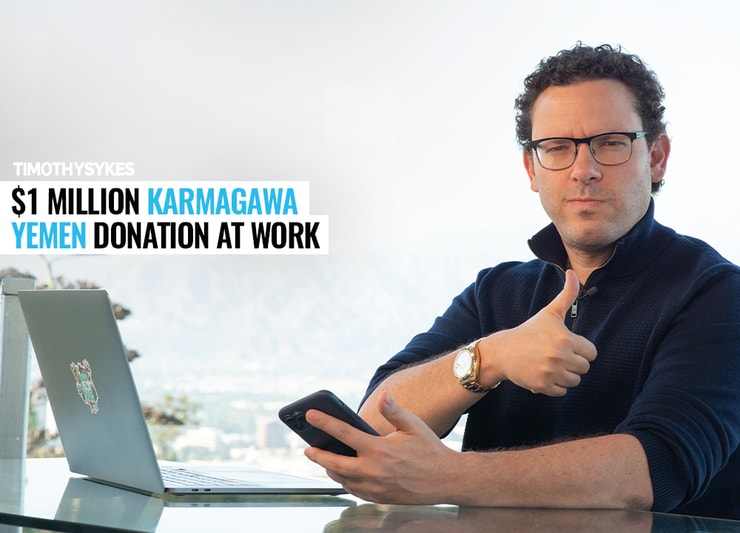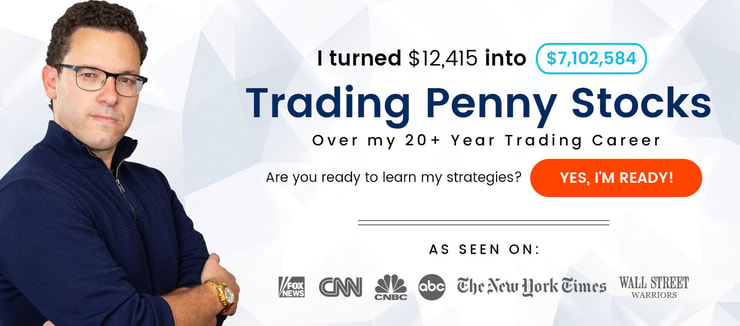I couldn’t have done it without you. In large part thanks to your generous donations, I was able to make a $1 million Karmagawa Yemen donation in 2020.
The situation in Yemen continues to be dire — learn more in this blog post. It’s my honor to be able to assist the children and people in need in this war-torn country.
In a developing country like Yemen, $1 million can go a long way in terms of improving people’s quality of life. So far, our donation has directly assisted over 30,000 people.
I’m committed to full transparency as a trader and teacher … That goes for my charitable donations too. Let’s take a look at the Karmagawa Yemen donation and how the funds are being put to work…
View this post on Instagram
Table of Contents
The Power of Social Media
When I first posted about my intention to make a Karmagawa Yemen donation, the initial goal was to raise $200K.
I was completely floored by the response. Within 12 hours, we received $95K in donations.
This is why I love social media so much, we have now raised $95,000+ in the past 12 hours in our @karmagawa fundraiser to aid in the #YemenCrisis & add in the $25k I made from trading yesterday + $5k so far today, that’s $125k so far, see https://t.co/qPWrn4EnXb & help Yemen too! pic.twitter.com/jp8FD2xmjD
— Timothy Sykes (@timothysykes) June 16, 2020
So we raised the goal and you kept donating…
Between your donations, Karmagawa donations, and my personal donation of about $370K from my June and July 2020 trading profits*, we were able to donate a total of $1 million.
The story went viral … It was even featured in the New York Post.
It just goes to show the power of social media. I recognize that it’s a privilege to have this sort of influence, and I’m committed to using it for good.
It Pays to Be Transparent
As a trader, I’m fully transparent — I share every trade publicly. I’m open about my position sizes and share commentary on both my wins and my losses.
I’m also fully transparent about my motivation as a trader. I trade to teach, and I donate all of my trading profits to charity.
I didn’t always teach and trade this way — it’s been an evolution. I started trading 20+ years ago with about $12K of bar mitzvah money. As of February 2021, I’ve turned it into over $6.6 million.*
Wanna know more? You can read more about my trading journey in my autobiography, “An American Hedge Fund.”
(*While I’ve enjoyed remarkable success trading stocks over the years, earning over $6 million in trading profits over the past 20 years, my primary income comes from the sale of financial education products and subscription services offered by various businesses and websites in which I have an ownership stake.)
Changing Priorities

Over the years, my priorities as a trader and human being have changed.
I grew up in a middle-class town in Connecticut. When I first started trading, I wanted to become rich. I wanted a better life.
When I started making money, I saw it as my chance to live out my childhood dreams. So I did things like buying fancy cars.
I love that I got to do that … I love that I was able to buy my parents their dream home, too.
But as time went on, acquiring things had diminishing returns.
Don’t get me wrong, I didn’t turn into a saint or anything. I like treating myself, traveling, eating well … In fact, in a recent roundtable Trading Challenge webinar, I talk about how I’ve been indulging in flan and churros with newly-minted millionaire trader and Trading Challenge moderator Matthew Monaco.**
I have enough money to take care of myself. I’m financially secure.*
Now, I want to give back to others. That’s what inspires me.
I want to live by example. That’s why I trade and teach. I want to help others get the life they want … And hopefully, follow my example by giving back like this student.
More Breaking News
- Oracle’s $50B Cloud Expansion Plans Fuel Stock Surge
- Credo Technology Stock Skyrockets After Impressive Fiscal Performance
- Price Predictions Fueled by Company Moves In Market Dynamics
- Huntington Bancshares Misses Q4 Earnings Estimate Amid Turbulent Market Conditions
(**Please note that Matthew’s trading results are not typical. Most traders lose money. It took Matthew years of dedication, hard work, and discipline to learn how to trade. Individual results will vary. Trading is inherently risky. Before making any trades, remember to do your due diligence and never risk more than you can afford to lose.)
Our Karmagawa Yemen Donation at Work
It’s my honor to donate and help make the world a better place. I’m proud that I can be part of helping save the children in Yemen.
As of late 2020, over $500K had been donated to Partners Relief & Development.
As you can see in this tweet, it’s been allocated to all sorts of things like shelter, meals, food baskets, blankets, and school supplies like backpacks and uniforms to help children get back to school.
After you study/work hard enough to take care of yourself/your family what matters most in life is what you can do to help others in need, I'm SO proud of what my charity @karmagawa is doing right now to help families in need in Yemen via our $500,000+ donation to @PartnersRelief pic.twitter.com/3UAJcG0dy9
— Timothy Sykes (@timothysykes) December 3, 2020
What I love about working with a charity like this is that they have people on the ground in Yemen. They’re small enough to be nimble and operate in this war-torn country, but established enough to have a wide reach.
So far, the Karmagawa Yemen donation has directly assisted over 30,000 people.
Continuing to Give Back
I’m proud of what the Karmagawa Yemen donation has done so far…
But there’s still so much to be done.
Along with Karmagawa, I’ve also helped raise money to assist people in Beirut, Lebanon … I’ve also helped raise more than $100K for more schools and relief in Bali, Indonesia … And helped raise funds to assist in oil spill cleanup efforts in Mauritius.
View this post on Instagram
I’ve got projects in the U.S., too.
I recently donated $100K to the Houston Food Bank…
View this post on Instagram
Thanks to the efforts of my friend and SteadyTrade Team lead trainer Tim Bohen from StocksToTrade, I also made a donation to help save and relocate a library in his neck of the woods in Michigan.
Survive … Then Help Others Thrive
When I talk about things like this Karmagawa Yemen donation, I’m not trying to guilt-trip you into donating all of your trading profits to charity.
What I really want is to help you figure out what motivates you.
It’s kind of like they say in an airplane — if the oxygen masks drop, you’ve gotta put yours on first before you should attempt to assist others.
You can’t help anyone if you’re unconscious. So yes, take care of yourself. Attend to your needs and your family’s needs first.
Maybe that will be your initial motivation as a trader: giving yourself and your family a better life. That was my motivation at first.
Now, giving to others is what helps keep me motivated as a trader. It gives me purpose.
What Gives You Purpose?
Don’t let anyone tell you what you should and shouldn’t do with your money. You get to choose.
What gives YOU purpose?
Family, charity, travel, luxury, security? Something else? There’s no right answer. I want you to think about what motivates you and use it to continue to get better and keep studying.
This is exactly why I send my late-night motivation posts on social media. I want you to push yourself and dream big!
10:52pm study check, retweet/favorite this if you’re up studying, making your watchlist for tomorrow or if you made a trade or papertrade on @StocksToTrade today as the market is CRAZY right now so it’s important to truly maximize your education every day, it compounds over time!
— Timothy Sykes (@timothysykes) February 9, 2021
It’s my honor to donate 100% of my trading profits to charity. I want more people to pursue their dreams … If you think trading could be part of helping you do that, I want to do what I can to help.
Are you ready to work hard for it? If so, consider applying for my Trading Challenge.
I’m curious … What motivates YOU? There’s literally no wrong answer. I don’t care if it’s charity, cars, buying a house. Be honest! I love hearing from you.




Leave a reply